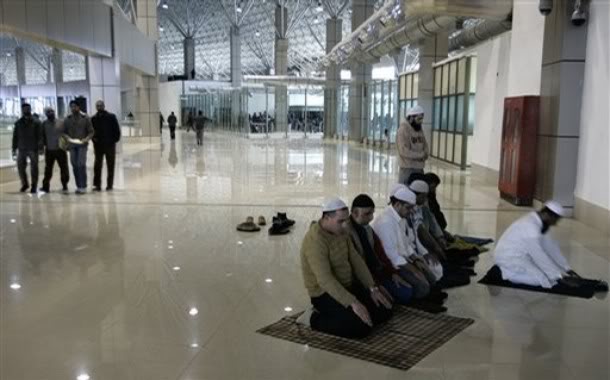Can I Follow Another School of Law When Traveling? (Shafi’i)
Shafi'i Fiqh
Answered by Shaykh Abdurragmaan Khan
Question: Assalam alaykum,
Can I follow the ruling related to travel according to the Hanafi school despite being a Shafi’i?
Can I recite the Hanafi tashahud despite praying according to the Shafi’i school?
Answer: Wa alaykum al-Salam
Thank you for your question.
Why follow a madhhab?
Our scholars did not view the madhahib or schools of jurisprudence as four walls surrounding an individual, forcing him to remain in and preventing him from exiting. Rather, the madhahib offered a systematic approach to the Quran and Sunnah that ensured Muslims have consistency in their manner of implementing Allah’s law.
In other words, the approach or method (legal theory or Usul al-fiqh) of Imam Abu Hanifah to the Quran and Sunnah, even though possibly 90% the same, had variances with the approach or method of Imam al-Shafi’i. By way of example, Imam Abu Hanifah would give preference to weak tradition over a secondary source of law, while Imam al-Shafi’i on the other hand maintained that a weak narration is not suitable for establishing law and thus prefered the adoption of a secondary source of law. Consequently, Imam Abu Hanifah held that the maximum period of menstruation is 10 days based on a weak tradition, while Imam al-Shafi’i, based on the secondary source of law, deduction, opined that the maximum period of menstruation is 15 days.
Switching between madhahib would effectively mean that your practices today, based on approach A will differ with your practices of tomorrow that will be based on approach B. And Allah knows best.
Can I depart from my school of jurisprudence?
That being said, the scholars would permit one to depart from his madhhab on certain occasions. There’s a difference of opinion amongst the schools when and when not is one allowed to depart. Certain scholars or schools adopted more stringent conditions, while others, such as our Imams of the Shafi’i school were more lenient. According to the Shafi’is one would be permitted to depart from one school if the following conditions are met:
1. That he follows an alternative position that exists within one of the for schools of jurisprudence.
2. That he does not go about in an exhaustive search of the most lenient and easiest positions in the various schools (tatabbu’ al-rukhas).
4. That he is not guilty of talfiq. Talfiq means that one adopts the positions of various schools in an action, which eventually leads to an outcome that considers the action invalid according to all schools. By way of example, after performing ablution or wudu’, he bleeds, but considers his wudu’ intact based on the Shafi’i school. Later he touches his wife and considers his wudu’ intact based on the Hanafi school. The end result being that his wudu is not valid according to both the Shafi’i and Hanafi schools respectively.
Your question
Based on the discussion above, you may adopt the Hanafi school and consider yourself a traveler for 15 days, especially since you’ll be avoiding hardship as you indicated in your question.
What remains is, are you allowed to pray Isha complete with four units or should you shorten the prayer as is required for the traveler in the Hanafi school? Also, do you have to pray Salah in general according to Hanafi law?
These questions require a further discussion on talfiq and which forms of talfiq is considered problematic.
Talfiq in one qadiyyah:
Some scholars, including ibn Ziyad, held that talfiq is only problematic if it takes place in a single action or ritual, such as the example given above. This was similarly the position of some of our teachers and one that I personally incline towards.
In this instance, you may consider yourself a traveler according to the Hanafi school, but not be required to observe the Hanafi rulings when praying. Thus you may pray Isha as four units and may continue making qunut in your Fajr prayer as usual.
Talfiq in two qadiyyas:
Others held that talfiq will also be problematic if it existed in two combined actions. By way of example, after performing ablution, he bleeds and considers his wudu intact according to the Shafi’i school. Thereafter he performs salah, without facing the exact direction of qiblah based on the Hanafi school. The end result here being that the prayer will not be valid according to both the Shafi’i and Hanafi schools respectively.
According to this position, you will have to observe Hanafi rulings of salah while considering yourself a traveler based on their school, and Allah knows best.
Hanafi and Hanbali tashahhud
The differences between the formulas of tashahhud are all, to the best of my knowledge, taken from different traditions of the Prophet sallaLlahu alayhi wasallam. Scholars referred to these variations or differences as ikhtilaf al-tanawwu’ or differences of choice. As long as the source of any supplication, greeting or prayer is the Prophet sallaLlahu alayhi wassalam, one may follow and emulate him. When the schools adopted one formula over the other, it was by no means to the exclusion of other transmitted formulas. You may thus continue with the tashahhud that you’ve learnt. In addition, you may memorize the other formulas of tashahhud and alternate between them.
And Allah knows best.
Wassalam
[Shaykh] Abdurragmaan Khan
Shaykh Abdurragmaan received ijazah ’ammah from various luminaries, including but not restricted to: Habib Umar ibn Hafiz—a personality who affected him greatly and who has changed his relationship with Allah, Maulana Yusuf Karaan—the former Mufti of Cape Town; Habib ‘Ali al-Mashhur—the current Mufti of Tarim; Habib ‘Umar al-Jaylani—the Shafi‘i Mufti of Makkah; Sayyid Ahmad bin Abi Bakr al-Hibshi; Habib Kadhim as-Saqqaf; Shaykh Mahmud Sa’id Mamduh; Maulana Abdul Hafiz al-Makki; Shaykh Ala ad-Din al-Afghani; Maulana Fazlur Rahman al-Azami and Shaykh Yahya al-Gawthani amongst others.
